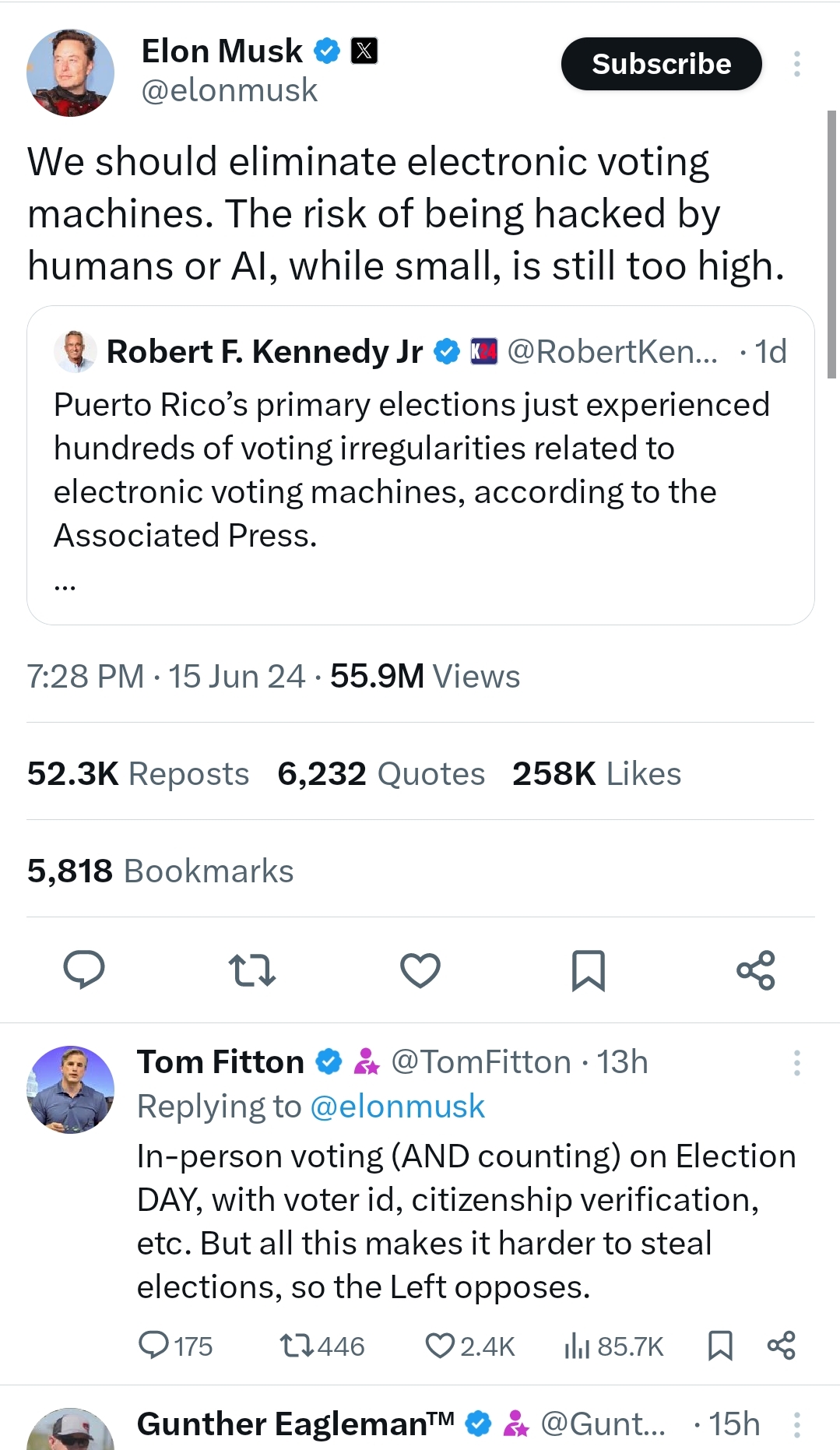this post was submitted on 17 Jun 2024
256 points (86.4% liked)
People Twitter
5268 readers
583 users here now
People tweeting stuff. We allow tweets from anyone.
RULES:
- Mark NSFW content.
- No doxxing people.
- Must be a tweet or similar
- No bullying or international politcs
- Be excellent to each other.
founded 1 year ago
MODERATORS
you are viewing a single comment's thread
view the rest of the comments
view the rest of the comments

Wow. I actually agree with Elon Musk about something for once, what a shock!
Tom Scott has a very good video explaining why electronic voting is terrible all around and it will probably never be secure.
Tom Scott's video: https://www.youtube.com/watch?v=LkH2r-sNjQs Tom Scott's video via the Computerphile channel: https://www.youtube.com/watch?v=w3_0x6oaDmI&t=1s
It is actually possible to have a cryptographic structure that allows independent verification of the counts. Of course we will never have that because Repubs prefer buggy ES&S machines. (IIRC those are also the ones Kemp used to rig elections in GA.)
https://archive.is/2020.09.15-120013/https://www.wired.com/story/dana-debeauvoir-texas-county-clerk-voting-tech-revolution/
But is scantron voting electronic voting? Is mail in voting and early voting electronic voting? Is being ID'd on the voter registry because you know your SSN and address, name, signature, without having to use yet another ID electronic voting?
I would say that "electronic voting" means that the ballot itself is digital rather than physical. So, scantrons are not electronic voting and voter registries/ID/etc. are not ballots in the first place.
I think the supposed risk to electronic voting machines is that there would need to be thousands of them, are distributed, somewhat unattended, and operated by people that don't know them.
The possibility of an exploit or misconfiguration increases, and the ability to compromise someone supervising one of the polling station increases.
If there is are centralised systems, fewer higher skilled people would be required to secure/monitor/run the system. It can also be airgapped.
While some of these risks are also applicable to in-person and mail-in voting, these systems have been around for ages, are not proprietary, and anyone can figure out "how it works" and can make sure "how it happened" matches.
As soon as you get into cryptographic vulnerabilities and security, 99.99% of people would be lost in the woods
The rest of the questions, I feel, are more systematic things.
Seems to work alright for Estonia, they have had an option to vote electronically since 2005. If I can sign legal documents, pay bills and do other government related stuff electronically, why suddenly voting is a huge problem?
Because what you vote is supposed to be anonymous....
If you ignore the anonymous part, then it's obviously not an issue.
The only real risk comes if their voting server that decrypts votes would be compromised and no one would realise it. As with any electronic service there of course is some risk, nothing is 100% secure, but I would personally take that risk to vote electronically.
Here's an overview how their process works, feels pretty solid.
It's not a question if encryption fails, but when. Paper ballots are anonymous by design, unless you mark the ballots they are untraceable. Digital ballots don't have that feature.
https://xkcd.com/2030/
even a broken clock is correct twice a day
When did Lemmy get infiltrated by MAGA?
That's loads of BS. Manual in person voting is easily scammed, just look at voting in Russia. Fuck this shit, everything should be 100% digital.
Paper voting leaves a literal paper trail unlike electronic voting that's always a total black box in all countries that have tried it.
Blockchain based voting leaves a permanent and indelible record on the blockchain for all to see.
Look, mate, paper voting simply doesn't work. And Russia is not the only example.
Canada here, paper voting works just fine.
What doesn't work is when the voting systems are gamed for the benefit of the few, and that can happen with any and all systems.
If you think results contradict content of the boxes, then online voting just allows to do it on greater scale much easier.
No, online voting prevents malicious actors from scamming the voting process.
Manual in person voting is not easily scammed on a scale that can swing an election. The slow, inefficient, in person, physical process is a security feature.
Lol what?
A system being slow and inefficient makes defrauding that system similarly slow and inefficient. To affect an election run on paper ballots you have to somehow physically alter or insert thousands or millions of pieces of paper without being detected. This will mean spending large amounts of time and money and must necessarily involve numerous people.
https://www.theguardian.com/world/video/2024/mar/15/russian-woman-detained-after-pouring-dye-into-ballot-box-video
Mate, are you high? https://www.youtube.com/watch?v=owSxq50-DsI
https://x.com/Maks_NAFO_FELLA/status/1770364450144489510
I don't get what's wrong with paper ballots sent by mail. It's convenient and easy, with a paper trail for recounts. It's worked great in Washington for decades.
Look at my other replies.
it absolutely is not easily scammed at all.
every single piece of paper is numbered and tracked. (tickets and stubbs, basically). all counting is done by multiple people and watched by anyone who wants. political parties are banned from voting premises.
even better: early voting, in person, up to a week or two before. no crowds.
errors happen about 1 in 1,000,000 with a maximum of a couple hundred, and are caught immediately.
there is no scamming. all of the USA's voting problems are self-created.
Ahaha! Ok.
Let me check. *looks through window* It's not the biggest source of voting fraud. Biggest source of voting fraud is Venedictov's box - Digital Electronic Voting.
Sobyanin approves.
Not just digital but trustless decentralised blockchain based so it's impossibly hard to manipulate
https://xkcd.com/2030/